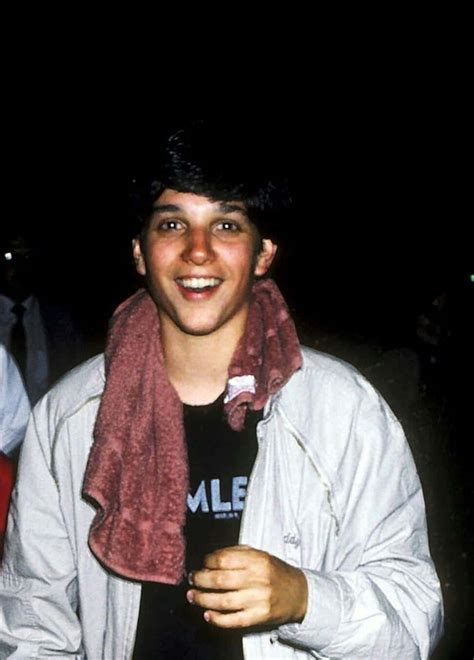
Ralph Macchio, best known for his role as Daniel LaRusso in “The Karate Kid,” recently revealed that his only teen heartthrob crush was on actress Diana DeGarmo, who rose to fame on “American Idol.”
In a new interview, Ralph Macchio, the actor synonymous with the “Karate Kid” franchise, disclosed his long-held admiration for Diana DeGarmo, the powerhouse vocalist who captured hearts during her run on the third season of “American Idol” in 2004. Macchio, now 62, confessed that DeGarmo, then a teenager, was his sole celebrity crush during his own teenage years. The revelation, made during a candid discussion, surprised many, given Macchio’s established career and personal life.
Macchio, who achieved widespread recognition in the 1980s, admitted his crush developed during DeGarmo’s impressive performances on the singing competition. While the actor did not elaborate on the specifics of his admiration, the disclosure adds an unexpected dimension to his public persona. The context of the interview suggests the topic arose organically, allowing Macchio to reflect on the cultural impact of “American Idol” and the phenomenon of teen idols.
“American Idol,” which premiered in 2002, quickly became a cultural phenomenon, launching the careers of numerous artists and captivating a vast audience. Diana DeGarmo’s participation in the third season was particularly memorable. Her powerful voice and stage presence made her a fan favorite, and she ultimately finished as the runner-up to Fantasia Barrino. DeGarmo has continued to work in the entertainment industry, appearing on Broadway, television, and releasing music.
Macchio’s “Karate Kid” legacy remains strong, with the ongoing success of the Netflix series “Cobra Kai,” which revisits his iconic character Daniel LaRusso. The show has introduced Macchio to a new generation of fans while also appealing to those who grew up with the original films.
The actor’s personal life has been stable and enduring. He has been married to his wife, Phyllis Fierro, since 1987. They have two children together, solidifying Macchio’s reputation as a devoted family man. This detail makes his admission of a teenage crush all the more surprising and relatable, humanizing the star who has long been a fixture in popular culture.
The unexpected revelation about Macchio’s teen crush on DeGarmo highlights the cultural impact of “American Idol” and the enduring appeal of both stars. The anecdote provides a glimpse into the personal life of a beloved actor while acknowledging the broad influence of a reality television phenomenon.
The disclosure prompted discussions about celebrity crushes, the impact of “American Idol” on popular culture, and the enduring appeal of both Macchio and DeGarmo. Many fans expressed surprise and amusement, while others shared their own stories of teenage celebrity infatuations.
The news cycle quickly picked up the story, with various entertainment outlets reporting on Macchio’s revelation. Social media platforms buzzed with comments and reactions, demonstrating the ongoing interest in both Macchio and DeGarmo. The story resonated with many due to its lighthearted nature and the nostalgic connection to both “The Karate Kid” and “American Idol.”
Macchio’s career has spanned several decades, beginning with roles in television series such as “Eight Is Enough” before his breakthrough performance in “The Karate Kid” in 1984. The film became a box office success and cemented Macchio’s status as a teen idol. He reprised his role in subsequent “Karate Kid” sequels and has continued to work in film and television.
Diana DeGarmo’s post-“American Idol” career has included roles on Broadway in productions like “Hairspray” and “9 to 5: The Musical.” She has also appeared on television shows such as “The Young and the Restless.” DeGarmo has continued to release music, showcasing her vocal talents in various genres.
The convergence of these two well-known figures—Macchio, the “Karate Kid” star, and DeGarmo, the “American Idol” sensation—creates a unique and intriguing narrative. Macchio’s acknowledgment of his teen crush underscores the cultural influence of these celebrities and the impact they have had on audiences of different generations.
Macchio’s recent comments provide an opportunity to reflect on the broader phenomenon of celebrity crushes. For many people, celebrity crushes are a normal part of adolescence, representing a form of admiration and fantasy. These infatuations often reflect the qualities and characteristics that individuals find appealing or inspiring. In Macchio’s case, his admiration for DeGarmo likely stemmed from her talent, charisma, and stage presence.
The lasting impact of “American Idol” cannot be overstated. The show revolutionized the reality television landscape and launched the careers of numerous successful artists. “American Idol” not only provided a platform for aspiring singers but also shaped popular music and entertainment trends. The show’s success paved the way for other singing competitions and reality shows, transforming the television industry.
Moreover, the story highlights the ways in which celebrities, despite their fame and success, are also subject to the same human experiences as everyone else. Macchio’s admission of a teen crush demonstrates that even well-known actors can have moments of admiration and infatuation. This relatability can enhance their connection with fans and humanize their public image.
The coverage of Macchio’s revelation has been widespread, reflecting the enduring interest in celebrity news and personal anecdotes. Entertainment outlets have highlighted the surprise factor of the story, emphasizing the unexpected nature of Macchio’s disclosure. Social media reactions have ranged from amusement to nostalgia, demonstrating the broad appeal of the narrative.
In conclusion, Ralph Macchio’s admission of his teen crush on Diana DeGarmo offers a lighthearted and intriguing glimpse into the personal life of a beloved actor. The story underscores the cultural impact of both “The Karate Kid” and “American Idol,” while also highlighting the universal experience of celebrity crushes. The widespread coverage and social media reactions demonstrate the enduring interest in celebrity news and the ability of these stories to resonate with a wide audience. The event serves as a reminder that even celebrities, despite their fame and success, share common human experiences and emotions.
Expanded Context and Analysis:
The seemingly simple revelation of Ralph Macchio’s teen crush on Diana DeGarmo opens a door to a broader examination of celebrity culture, the impact of reality television, and the enduring power of nostalgia. The story isn’t just about a celebrity confession; it’s a microcosm of societal fascination with fame, talent, and personal lives.
-
The Power of “American Idol”: “American Idol” wasn’t just a TV show; it was a cultural phenomenon that democratized the music industry. Before its rise, aspiring singers often needed connections, resources, or luck to break into the business. “Idol” provided a direct, televised pathway to stardom, judged by both industry professionals and the public. Diana DeGarmo’s success on the show represents this shift. She wasn’t just a talented singer; she was a relatable figure who connected with viewers on a personal level, driving them to vote and support her. Her runner-up position was a testament to her talent and the show’s ability to create instant stars. The show’s influence extends far beyond individual careers, impacting the entire music industry and shaping the landscape of reality television.
-
The Enduring Appeal of “The Karate Kid”: “The Karate Kid” resonated with audiences because it told a classic underdog story. Daniel LaRusso, the new kid in town, facing bullies and finding guidance in Mr. Miyagi, was a character that resonated with viewers of all ages. The film’s themes of perseverance, self-discovery, and the importance of mentorship are timeless. The success of “Cobra Kai” decades later proves the enduring power of the original film and its characters. Macchio’s portrayal of Daniel LaRusso remains iconic, cementing his status as a beloved figure in popular culture. The film’s influence transcends generations, inspiring countless individuals to embrace martial arts and strive for personal growth.
-
Celebrity Crushes as a Social Phenomenon: Celebrity crushes are a common and often harmless aspect of adolescence and beyond. They represent a way for individuals to explore their interests, fantasies, and desires. These crushes are often based on admiration for talent, physical appearance, or perceived personality traits. While celebrity crushes are often fleeting, they can also play a role in shaping an individual’s identity and values. The phenomenon highlights the human tendency to idolize individuals who possess qualities that are admired or aspired to. Moreover, celebrity crushes can foster a sense of community, as fans connect with each other through shared admiration for a particular celebrity.
-
The Relatability Factor: What makes Macchio’s confession so appealing is its relatability. He’s not presenting himself as an untouchable celebrity; he’s admitting to a common experience that many people can relate to. This humanizes him and strengthens his connection with fans. It also serves as a reminder that celebrities, despite their fame and fortune, are still individuals with their own personal experiences and emotions. By sharing this anecdote, Macchio invites fans to see him as more than just an actor, but as a person who has experienced the same kinds of feelings and infatuations that they have.
-
The Evolution of Teen Idols: The concept of the teen idol has evolved significantly over time. In the 1980s, when Macchio rose to fame, teen idols were often marketed and packaged by record labels and studios. Today, with the rise of social media and reality television, teen idols can emerge from a variety of sources and often have a more direct connection with their fans. The rise of “American Idol” played a significant role in this shift, allowing ordinary individuals to transform into overnight sensations. Diana DeGarmo’s success on the show exemplifies this transformation, demonstrating the power of television to create instant stars.
-
Nostalgia and Pop Culture: The story taps into a sense of nostalgia for both “The Karate Kid” and “American Idol.” These cultural touchstones evoke memories of a specific time and place, allowing people to relive positive experiences and emotions. Nostalgia is a powerful force in popular culture, driving the revival of classic films, TV shows, and music. The success of “Cobra Kai” is a prime example of this phenomenon, demonstrating the enduring appeal of nostalgic content. By referencing these cultural touchstones, the story resonates with a wide audience and sparks conversations about shared memories and experiences.
-
The Role of Media in Shaping Perceptions: The media plays a significant role in shaping public perceptions of celebrities. Entertainment outlets often focus on personal anecdotes and behind-the-scenes stories to humanize celebrities and make them more relatable to audiences. The coverage of Macchio’s revelation is a prime example of this trend, demonstrating the media’s ability to transform a seemingly trivial anecdote into a newsworthy event. The way in which the media frames these stories can have a significant impact on public opinion and the overall perception of celebrities.
-
The Intersection of Fame and Privacy: Celebrities often struggle to balance their public image with their personal lives. While fame can bring numerous opportunities and rewards, it also comes with a loss of privacy and increased scrutiny. The story of Macchio’s teen crush highlights this tension, demonstrating how even seemingly innocuous details about a celebrity’s personal life can become fodder for public consumption. Navigating this delicate balance requires careful management of one’s public image and a willingness to share certain aspects of one’s personal life while maintaining a degree of privacy.
-
The Enduring Power of Human Connection: At its core, the story underscores the enduring power of human connection. Whether it’s the connection between a performer and their audience, the connection between fans who share a common interest, or the connection between individuals who can relate to each other’s experiences, these connections are essential to the human experience. Macchio’s revelation, while seemingly trivial, serves as a reminder of the importance of these connections and the ways in which they enrich our lives.
-
Macchio’s Enduring Legacy: Ralph Macchio’s career has been marked by both commercial success and critical acclaim. His portrayal of Daniel LaRusso in “The Karate Kid” cemented his status as a cultural icon, and his subsequent work in film and television has demonstrated his versatility as an actor. The success of “Cobra Kai” has introduced Macchio to a new generation of fans, ensuring that his legacy will endure for years to come. His ability to connect with audiences on both a personal and professional level has contributed to his enduring popularity and cemented his status as one of the most beloved actors of his generation.
In-Depth Look at Macchio and DeGarmo’s Careers:
To further understand the context of this news, it’s essential to delve deeper into the careers of both Ralph Macchio and Diana DeGarmo.
Ralph Macchio:
- Early Career: Macchio’s career began with television roles in the late 1970s, including a recurring role in the drama “Eight Is Enough.” This early exposure provided him with valuable experience and laid the foundation for his future success.
- “The Karate Kid” Phenomenon: The release of “The Karate Kid” in 1984 catapulted Macchio to international stardom. The film’s commercial success and critical acclaim made him a household name and established him as a teen idol.
- Post-“Karate Kid” Roles: Following “The Karate Kid,” Macchio continued to work in film and television, taking on a variety of roles that showcased his versatility as an actor. These roles included performances in films such as “Crossroads” and “My Cousin Vinny.”
- Broadway Debut: Macchio made his Broadway debut in 1986, demonstrating his talent for live performance and expanding his repertoire beyond film and television.
- “Cobra Kai” Revival: The success of “Cobra Kai” on Netflix has revitalized Macchio’s career and introduced him to a new generation of fans. The show’s blend of nostalgia and contemporary storytelling has resonated with audiences of all ages.
- Enduring Appeal: Macchio’s enduring appeal stems from his relatability, his talent as an actor, and his ability to connect with audiences on a personal level. His portrayal of Daniel LaRusso remains iconic, and his work on “Cobra Kai” has solidified his legacy as one of the most beloved actors of his generation.
Diana DeGarmo:
- “American Idol” Stardom: DeGarmo’s participation in the third season of “American Idol” launched her career and made her a household name. Her powerful vocals and charismatic stage presence captivated audiences and earned her a dedicated fan base.
- Post-“Idol” Music Career: Following “American Idol,” DeGarmo released her debut album, “Blue Skies,” which reached the top 40 on the Billboard 200 chart. She has continued to release music, showcasing her versatility as a vocalist and exploring various genres.
- Broadway Success: DeGarmo has achieved significant success on Broadway, appearing in productions such as “Hairspray” and “9 to 5: The Musical.” Her talent for live performance and her ability to connect with audiences have made her a popular choice for Broadway producers.
- Television Roles: DeGarmo has also appeared on television, including a recurring role on the soap opera “The Young and the Restless.” Her experience in both acting and singing has made her a versatile performer who can excel in a variety of roles.
- Continued Relevance: DeGarmo’s continued relevance in the entertainment industry stems from her talent, her hard work, and her ability to adapt to changing trends. She has remained active in music, theater, and television, demonstrating her versatility and her commitment to her craft.
FAQ:
-
What exactly did Ralph Macchio say about Diana DeGarmo?
Ralph Macchio stated that Diana DeGarmo was his only teen heartthrob crush, referring to her popularity and talent during her time on “American Idol.” According to the source article, “He revealed that his only teen heartthrob crush was on Diana DeGarmo.”
-
Why is this news considered newsworthy?
The news is newsworthy due to the unexpected nature of the revelation, the nostalgia factor associated with both “The Karate Kid” and “American Idol,” and the general public interest in celebrity personal lives. It’s a lighthearted story that offers a glimpse into Macchio’s past and connects with the cultural impact of both celebrities.
-
Has Diana DeGarmo responded to Ralph Macchio’s comments?
The article does not specify whether Diana DeGarmo has responded to Ralph Macchio’s comments.
-
When did Diana DeGarmo appear on “American Idol”?
Diana DeGarmo appeared on the third season of “American Idol” in 2004, where she finished as the runner-up.
-
Besides “Cobra Kai,” what other projects has Ralph Macchio been involved in recently?
While “Cobra Kai” is his most prominent recent project, the article does not provide a comprehensive list of all of Ralph Macchio’s recent activities beyond his enduring legacy from the ‘Karate Kid’.









